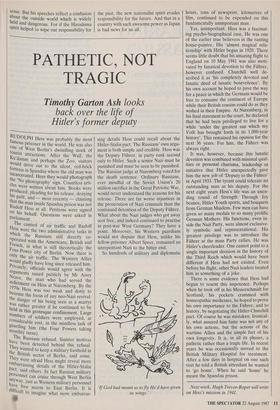PATHETIC, NOT TRAGIC
Timothy Garton Ash looks
back over the life of Hitler's former deputy
RUDOLPH Hess was probably the most famous prisoner in the world. He was also one of West Berlin's dwindling stock of tourist attractions. After the Wall, the Ku'damm and perhaps the Zoo, visitors would drive out to the silent, red-brick fortress in Spandau where the old man was incarcerated. Here they would photograph the 'No photography' sign. Countless arti- cles were written about him. Books were produced, pleading for his release, denying his guilt, and — most recently — claiming that the man inside Spandau prison was not Rudolf Hess at all. Petitions were signed on his behalf. Questions were asked in
parliament.
The control of air traffic and Rudolf Hess were the two administrative tasks in which the Russians still directly co- operated with the Americans, British and French, in what is still theoretically the Four-Power city of Berlin. Now there is only the air traffic. The Western Allies would gladly have long since released him. Privately, officials would agree with the arguments raised publicly by Mr Airey heave, the man who had served the indictment on Hess at Nuremberg. By the 1970s Hess was too weak and dotty to become the focus of any neo-Nazi revival: the danger of his being seen as a martyr Was rather greater if he continued to be held in this grotesque confinement. Large numbers of soldiers were employed, at considerable cost, in the mindless task of guarding him (the Four Powers taking monthly turns). The Russians refused. Sinister motives have been detected behind this refusal. They wanted to keep a military foothold in the British sector of Berlin, said some. They were afraid Hess might reveal more embarrassing details of the Hitler-Stalin pact, said others. In fact Russian military Personnel can cruise through West Berlin anyway, just as Western military personnel have free access to East Berlin. It is difficult to imagine what more embarras-
sing details Hess could recall about the Hitler-Stalin pact. The Russians' own argu- ment is both simple and credible. Hess was the Deputy Fiihrer, in party rank second only to Hitler. Such a senior Nazi must be punished and must be seen to be punished. The Russian judge at Nuremberg voted for the death sentence. Ordinary Russians, ever mindful of the Soviet Union's 20 million sacrifice in the Great Patriotic War, would never understand the reasons for his release. There are far worse injustices in the prosecution of Nazi criminals than the continued detention of the Deputy Fiihrer. What about the Nazi judges who got away scot free, and indeed continued to practise in post-war West Germany? They have a point. Moreover, his Western guardians would not dispute that Hess, unlike his fellow-prisoner Albert Speer, remained an unrepentant Nazi to the bitter end.
So hundreds of military and diplomatic 'If God had meant us to fly He'd have given us wings.' hours, tons of newsprint, kilometres of film, continued to be expended on this fundamentally unimportant man.
Yes, unimportant. Hess was a fascinat- ing psycho-biographical case. He was one of the earlier true believers in the ranting house-painter. His 'almost magical rela- tionship' with Hitler began in 1920. There seems little doubt that his amazing flight to England on 10 May 1941 was also moti- vated by fanatical devotion to the Fiihrer, however confused. Churchill well de- scribed it as 'his completely devoted and fanatic deed of lunatic benevolence'. By his own account he hoped to pave the way for a peace in which the Germans would be free to consume the continent of Europe while their British cousins could do as they wished in their Empire. At Nuremberg, in his final statement to the court, he declared that he had been privileged to live for a while 'under the greatest sun which my Volk has brought forth in its 1,000-year history'. This remained his opinion for the next 36 years. For him, the Fiihrer was always right. It was, however, because this lunatic devotion was combined with minimal qual- ities or personal charisma, leadership or initiative that Hitler unexpectedly gave him the new job of 'Deputy to the Fiihree in April 1933. The tyrant could tolerate no outstanding man as his deputy. For the next eight years Hess's life was an unen- ding round of Strength Through Joy beanos, Hitler Youth sports, and bouquets from German Maidens. Few men can have given so many medals to so many prolific German Mothers. His functions, even in- side the Nazi Party, were almost exclusive- ly symbolic and representational. His greatest privilege was to introduce the Fiihrer at the mass Party rallies. He was Hitler's cheerleader. One cannot point to a single important decision in the history of the Third Reich which would have been different if Hess had not existed. Even before his flight, other Nazi leaders treated him as something of a joke. There is some evidence that Hess had begun to resent this impotence. Perhaps when he took off in his Messerschmidt for Scotland, his pockets crammed with homeopathic medicines, he hoped to prove his own importance to the Fiihrer, and to history, by negotiating the Hitler-Churchill pact. Of course he was mistaken. Ironical- ly, what assured him fame was not any of his own actions, but the actions of the wartime Allies and the simple fact of his own longevity. It is, in all its phases, a pathetic rather than a tragic life. In recent years he was occasionally moved to the British Military Hospital for treatment. After a few days in hospital on one such visit he told a British attendant he wanted to 'go home'. When he said 'home' he meant the Spandau prison.










































 Previous page
Previous page